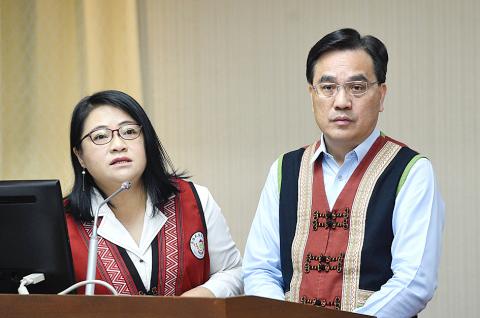Aborigines engaging in exchanges in China should insist on being recognized as Aborigines, and not as “Taiwanese minorities,” Council of Indigenous Peoples Minister Icyang Parod said yesterday.
“I cannot accept our Aborigines being called ‘minorities,’ which does not conform with our nation’s laws,” Icyang told a meeting of the Legislative Yuan’s Internal Administration Committee after he was invited to report on the state of the council.
Icyang also reviewed next year’s annual budget for the Indigenous Peoples Cultural Foundation.

Photo: George Tsorng, Taipei Times
Democratic Progressive Party (DPP) Legislator Chang Hung-lu (張宏陸) said he was not opposed to Aborigines meeting with members of China’s ethnic groups, but they should demand to be referred to as Taiwanese as a prerequisite for participation in such exchanges.
Being called a “Taiwanese minority” is disparaging to Taiwan’s first inhabitants, Chang said.
Having once been called “mountain compatriots” (山胞), Aborigines have endured a long process to be recognized as “Aborigines,” he said, adding that there was now a consensus on this terminology in Taiwan.
Even many of the ethnic groups in China referred to by Beijing as “minorities” are recognized by the UN as Aborigines, but the Chinese government has so far ignored UN convention on the matter, Icyang said.
DPP Legislator Hung Chun-yi (洪宗熠) criticized a statement by Kaohsiung Mayor Han Kuo-yu (韓國瑜), who recently said he supported the idea of putting flag platforms on the peaks of every mountain in Taiwan that is at least 3,000m above sea level.
Hung asked whether the KMT’s presidential candidate had sought the input of Aborigines.
The idea would be destructive to the environment and has already been shot down by Premier Su Tseng-chang (蘇貞昌), who confirmed that no development should take place on mountains considered sacred to Aborigines, Icyang said.
Citing Palau, Chinese Nationalist Party (KMT) Legislator Hsu Yu-jen (許毓仁) said that while Taiwan could not compete with China in terms of generating tourism revenue for Pacific Island nations, of which Palau is one of Taiwan’s four allies in the region, it has a special connection with those nations due to a shared family of Aboriginal languages.
Icyang presented some of the report in his native Amis language, which he said was an implementation of the Aboriginal Language Development Act (原住民族語言發展法) introduced on May 26, 2017.
The act made Aboriginal languages official, and stipulated that public institutions be required to provide official documents in them.
The council also provided written copies of yesterday’s report in Amis and Paiwan — the first time council reports were provided in those languages.

Chinese Nationalist Party (KMT) Chairman Eric Chu (朱立倫), spokeswoman Yang Chih-yu (楊智伃) and Legislator Hsieh Lung-chieh (謝龍介) would be summoned by police for questioning for leading an illegal assembly on Thursday evening last week, Minister of the Interior Liu Shyh-fang (劉世芳) said today. The three KMT officials led an assembly outside the Taipei City Prosecutors’ Office, a restricted area where public assembly is not allowed, protesting the questioning of several KMT staff and searches of KMT headquarters and offices in a recall petition forgery case. Chu, Yang and Hsieh are all suspected of contravening the Assembly and Parade Act (集會遊行法) by holding

PRAISE: Japanese visitor Takashi Kubota said the Taiwanese temple architecture images showcased in the AI Art Gallery were the most impressive displays he saw Taiwan does not have an official pavilion at the World Expo in Osaka, Japan, because of its diplomatic predicament, but the government-backed Tech World pavilion is drawing interest with its unique recreations of works by Taiwanese artists. The pavilion features an artificial intelligence (AI)-based art gallery showcasing works of famous Taiwanese artists from the Japanese colonial period using innovative technologies. Among its main simulated displays are Eastern gouache paintings by Chen Chin (陳進), Lin Yu-shan (林玉山) and Kuo Hsueh-hu (郭雪湖), who were the three young Taiwanese painters selected for the East Asian Painting exhibition in 1927. Gouache is a water-based

Taiwan would welcome the return of Honduras as a diplomatic ally if its next president decides to make such a move, Minister of Foreign Affairs Lin Chia-lung (林佳龍) said yesterday. “Of course, we would welcome Honduras if they want to restore diplomatic ties with Taiwan after their elections,” Lin said at a meeting of the legislature’s Foreign Affairs and National Defense Committee, when asked to comment on statements made by two of the three Honduran presidential candidates during the presidential campaign in the Central American country. Taiwan is paying close attention to the region as a whole in the wake of a

OFF-TARGET: More than 30,000 participants were expected to take part in the Games next month, but only 6,550 foreign and 19,400 Taiwanese athletes have registered Taipei city councilors yesterday blasted the organizers of next month’s World Masters Games over sudden timetable and venue changes, which they said have caused thousands of participants to back out of the international sporting event, among other organizational issues. They also cited visa delays and political interference by China as reasons many foreign athletes are requesting refunds for the event, to be held from May 17 to 30. Jointly organized by the Taipei and New Taipei City governments, the games have been rocked by numerous controversies since preparations began in 2020. Taipei City Councilor Lin Yen-feng (林延鳳) said yesterday that new measures by